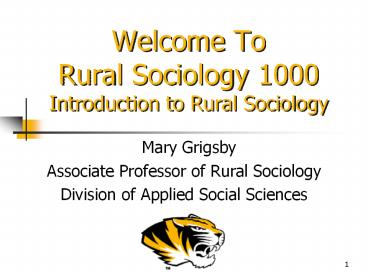Welcome To Rural Sociology 1000 Introduction to Rural Sociology - PowerPoint PPT Presentation
1 / 16
Title:
Welcome To Rural Sociology 1000 Introduction to Rural Sociology
Description:
Title: Introduction to the Academic Portfolio Author: Mary Grigsby Last modified by: Mary E. Grigsby Created Date: 2/15/2005 10:25:08 PM Document presentation format – PowerPoint PPT presentation
Number of Views:526
Avg rating:3.0/5.0
Title: Welcome To Rural Sociology 1000 Introduction to Rural Sociology
1
Welcome To Rural Sociology 1000 Introduction to
Rural Sociology
- Mary Grigsby
- Associate Professor of Rural Sociology
- Division of Applied Social Sciences
2
- Topics of Discussion
- Class Business
- Community Responses
3
- Case Study Approach-
- Garden City, Kansas Lexington, Nebraska Storm
Lake and Perry, Iowa and Rogers, Arkansas.
(Henness 2002) - Method Themes from Case studies inventoried and
organized into categories of local government,
housing, education, health care, social services,
law enforcement, and religious and civic life. - Within each category, impacts and responses are
arranged chronologically in order of occurrence. - Personal interviews with informants from
Missouri counties with high immigration and to
compare their perceptions with the inventory.
4
- Impacts
- Housing
- Lack of affordable housing
- Homelessness
- Overcrowding
- Hazardous, unsafe conditions
- Homeownership
- Responses
- Housing
- Temporary subsidized housing
- New rental arrangements (by the head)
- Area housing studies
- Homeless shelter startups
- Credit and mortgage education
- Starter home packages
5
- Impacts
- Education
- Overall enrollment
- School meal costs
- Low English proficient students
- ESOL (English for Speakers of Other Languages)
program costs - School dropout rates
- Responses
- Education
- Temporary classrooms
- ESOL program expansion
- Bilingual staff and paraprofessionals
- Multicultural teacher training
- Adult Learning Centers
- Bond issues to build/expand schools
6
- Impacts
- Health Care
- Demand for health services
- Immunization (tuberculosis)
- Emergency room visits
- Uninsured and underinsured patients
- Responses
- Health Care
- Health worker hires
- Caregiver translators
- New medical clinics for the under/uninsured
7
- Impacts
- Social Services
- Clients served
- Welfare and Medicaid cases
- Emergency food services
- Responses
- Social Services
- Subsidized transportation
- Furniture and clothing donations
- Pro bono accounting/legal counsel
- Worksite day care
- Interagency service coalitions
8
- Impacts
- Religious and civic life
- Church attendance gt
- Charitable giving gt
- Racial strife and tension
- Food, arts, music, cultural events
- Responses
- Religious and civic life
- Summer literacy camps for children
- Financial literacy training
- Community multicultural forums
- Immigrant family sponsorships
- Anti-immigration activism
9
- Impacts
- Law enforcement
- Immigration and legal documentation
- Traffic violations
- Violent and property crimes
- Substance abuse, spousal and child abuse
- Methamphetamine trafficking
- Responses
- Law enforcement
- Bilingual officer assignments
- Document translations
- Officer language training
- Additional hires
- Public education to dispel myths
10
Understanding Modern Social Organizations
Two Faces of Organizations Modern Organizations
Possess the Potential for Either Good or Harm
Positive Capable of efficiently managing people,
information, goods, and services on a worldwide
scale
Negative Capable of promoting inefficient,
irresponsible, and destructive actions that can
affect the well-being of communities and even the
entire planet
11
McDonaldization of Society
- The process by which the principles of the
fast-food restaurant are coming to dominate more
and more sectors of American society as well as
the rest of the world (Ritzer 1993, p. 1)
12
Traditional vs. Modern Societies
Traditional World Emphasis Modern World Emphasis
Community Kinship Individual Immediate Family
Rural and Village Life Urban Life
Work on Land or in Small Manufacture Factory and Large Scale Bureaucratic Organization
Landed Interests Business and Industrial Interests
Monarchy Democracy
Religion Reason
Church-mediated social thought Science-based social thought
13
Rationalization
- Does rationalization assume better
understanding or greater knowledge on the part of
most people?
14
Rationalization
- No. People who live in rationalized environments
typically know little detail about their
surroundings (nature, technology, the economy)
because they rely on expert knowledge to organize
the conditions of life, technology and consumer
goods.
15
Alienation
- A state in which human life is dominated by
forces of its inventions.
16
(No Transcript)































